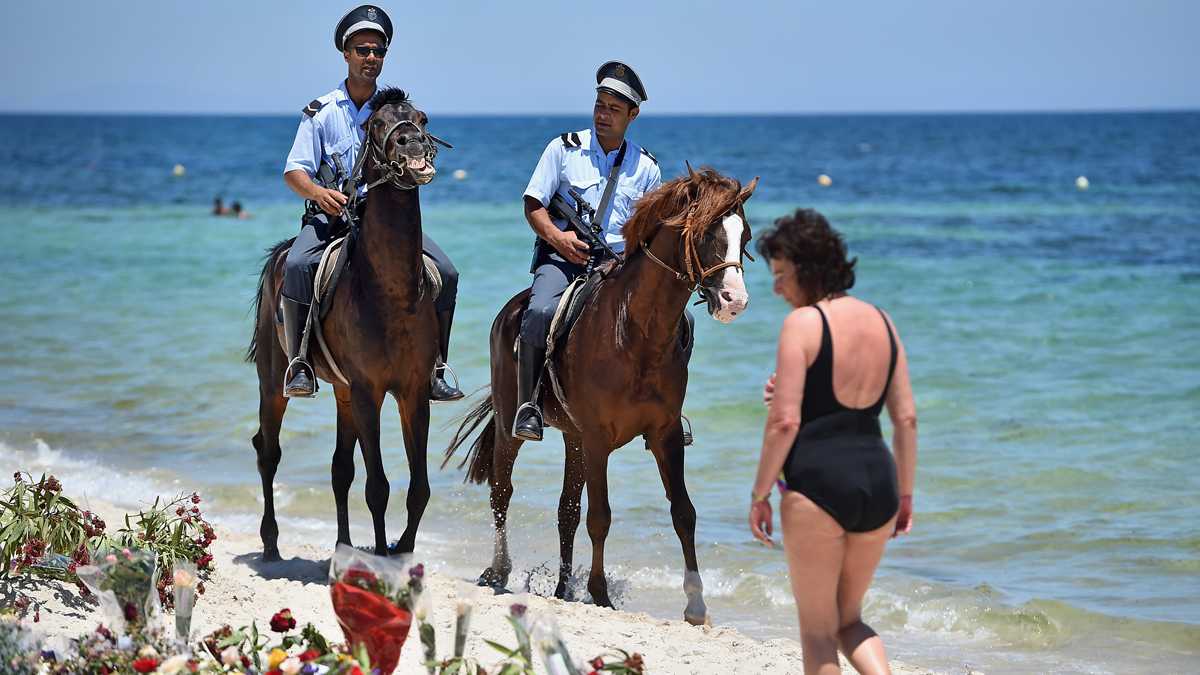Sousse massacre: why Tunisians don't believe their own media
Tunisians are increasingly turning to foreign media to find out what their newspapers aren't telling them

A free daily email with the biggest news stories of the day – and the best features from TheWeek.com
You are now subscribed
Your newsletter sign-up was successful
by Mourad Teyeb
Since last Friday's massacre of foreign tourists at a beach hotel in Sousse, Tunisian media outlets has been awash with reports on the attack and its aftermath, but most are being ignored by a Tunisian public mistrustful of official news reports.
After an initial period of confusion in the attack's immediate aftermath, the country's media focused primarily on the identification of the victims' bodies and their return to their respective home countries.
The Week
Escape your echo chamber. Get the facts behind the news, plus analysis from multiple perspectives.

Sign up for The Week's Free Newsletters
From our morning news briefing to a weekly Good News Newsletter, get the best of The Week delivered directly to your inbox.
From our morning news briefing to a weekly Good News Newsletter, get the best of The Week delivered directly to your inbox.
The arrests that followed also received media attention, as did the theories about which terror networks may have supported the attack and whether any further attacks can be expected.
But the widespread outcry over how Tunisian authorities failed to stop two bloody attacks in such quick succession was almost entirely ignored by media outlets known to be acquiescent to the political establishment. Most media companies in Tunisia are either owned by businesses directly linked to the country's former autocratic regime, or supported and financed by them.
One of the few serious reports on Tunisian media carried out by the Carnegie Endowment in 2012 found that "the Tunisian media is still a venue for manipulation, intimidation and bias".
A recent report (in Arabic) by Haica, Tunisia's media regulation body, found ethical and professional violations throughout the media's coverage of the Sousse attack. Haica mentioned "immoderate" and "irrational" treatment of information as well as "hate speech" by journalists. The regulator called on broadcasters to adopt a more professional approach to their coverage of terrorist attacks.
A free daily email with the biggest news stories of the day – and the best features from TheWeek.com
Instead of analysing the shortcomings of the security provisions in tourism resorts away from the country's capital, the media has instead focused its attention on difficult-to-prove links between the suspected gunman Seifeddine Rezgui and hard-line Islamist groups.
Questions remain over how the suspected gunman was able to spend 35 minutes on a shooting rampage without police intervention of any kind when the Hammam-Sousse police station is just ten minutes away from the crime scene.
As in the days of former ruler Zine El Abidine Ben Ali, who was ousted during the Arab Spring in 2011, Tunisians are once again turning to foreign press and social media to find out what their own newspapers, radio and TV networks are not telling them.
-
 Political cartoons for February 21
Political cartoons for February 21Cartoons Saturday’s political cartoons include consequences, secrets, and more
-
 Crisis in Cuba: a ‘golden opportunity’ for Washington?
Crisis in Cuba: a ‘golden opportunity’ for Washington?Talking Point The Trump administration is applying the pressure, and with Latin America swinging to the right, Havana is becoming more ‘politically isolated’
-
 5 thoroughly redacted cartoons about Pam Bondi protecting predators
5 thoroughly redacted cartoons about Pam Bondi protecting predatorsCartoons Artists take on the real victim, types of protection, and more
-
 Epstein files topple law CEO, roil UK government
Epstein files topple law CEO, roil UK governmentSpeed Read Peter Mandelson, Britain’s former ambassador to the US, is caught up in the scandal
-
 Iran and US prepare to meet after skirmishes
Iran and US prepare to meet after skirmishesSpeed Read The incident comes amid heightened tensions in the Middle East
-
 Israel retrieves final hostage’s body from Gaza
Israel retrieves final hostage’s body from GazaSpeed Read The 24-year-old police officer was killed during the initial Hamas attack
-
 China’s Xi targets top general in growing purge
China’s Xi targets top general in growing purgeSpeed Read Zhang Youxia is being investigated over ‘grave violations’ of the law
-
 Panama and Canada are negotiating over a crucial copper mine
Panama and Canada are negotiating over a crucial copper mineIn the Spotlight Panama is set to make a final decision on the mine this summer
-
 Why Greenland’s natural resources are nearly impossible to mine
Why Greenland’s natural resources are nearly impossible to mineThe Explainer The country’s natural landscape makes the task extremely difficult
-
 Iran cuts internet as protests escalate
Iran cuts internet as protests escalateSpeed Reada Government buildings across the country have been set on fire
-
 US nabs ‘shadow’ tanker claimed by Russia
US nabs ‘shadow’ tanker claimed by RussiaSpeed Read The ship was one of two vessels seized by the US military